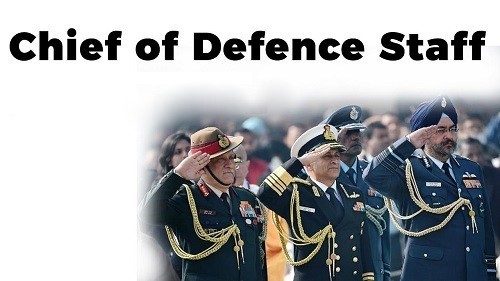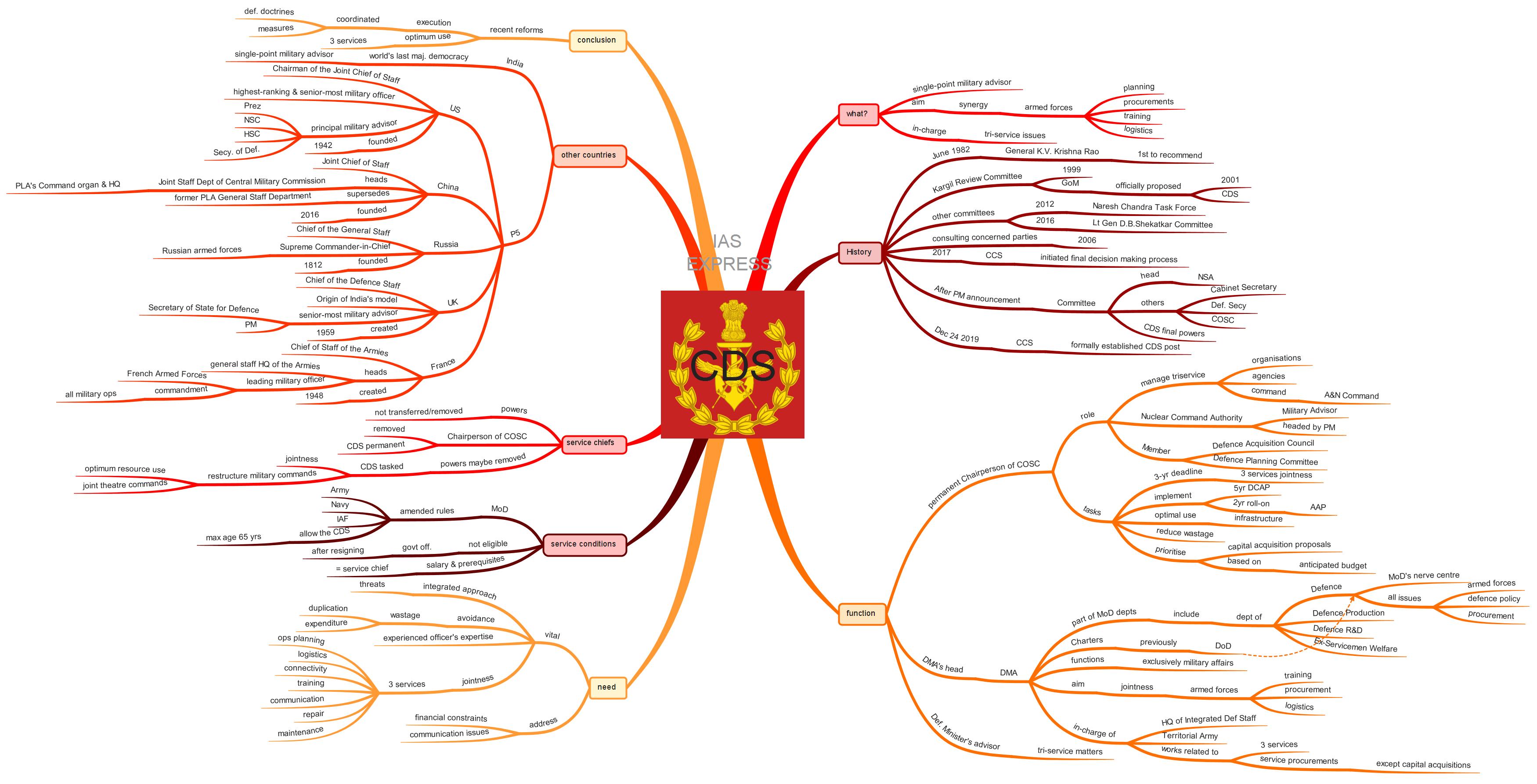Chief of Defence Staff (CDS) – Need, Roles, Functions, Challenges

General Bipin Rawat has become the first Chief of Defence Staff (CDS) of India on New Year’s Day. This came as the result of the centre’s approval for the creation of the new posting of the Chief of Defence Staff and the Department of Military Affairs under the Ministry of Defence. This position has been recommended by many for decades and the government was not able to implement this until now due to criticism from the political class on the possibility of a military takeover and the service staffs’ unwillingness to part their powers and confine themselves to only staff functions.
This topic of “Chief of Defence Staff (CDS) – Need, Roles, Functions, Challenges” is important from the perspective of the UPSC IAS Examination, which falls under General Studies Portion.
What is Chief of Defence Staff?
- Chief of Defence Staff (CDS) is a single-point military advisor to the government.
- This new post was created to inject some much-needed synergy in planning, procurements, training and logistics among the Indian armed forces.
- The CDS is in-charge of all the tri-service issues and will ensure “greater jointness” among the Army, Navy and the Air Force, which often pull in different directions without any inter-service prioritization to systematically build the country’s military capabilities with limited fiscal resources.
Why does India need CDS?
- There is an increasing need for an integrated approach to deal with the emerging complex security threats in the current times. This along with the financial constraints and communication issues makes it vital for India to have a Combined Defence Staff.
- CDS will promote jointness among the three services through the joint planning of operations, logistics, connectivity, training, communication, repair and maintenance. It will provide coordination and cooperation among the three services.
- The CDS is also responsible for the judicial management of the limited resources available with the armed forces. This will ensure the avoidance of needless duplication and unnecessary expenditure.
- An experienced 4-staff officer holds the post of Combined Defence Staff. This will allow for the utilization of his expertise and knowledge while dealing with hostile situations.
How did this post come to be?
- The idea to create the post of Chief of Defence Staff goes back to as early as Lord Mountbatten’s regime.
- In June 1982, General K.V. Krishna Rao was the first to put forth his opinion on the need for Chief of Defence Staff.
- However, it was based on the Kargil Review Committee’s recommendations in 1999 that the Group of Ministers (GoM) has officially proposed the creation of the post of CDS in 2001.
- The following committees, including the Naresh Chandra Task Force in 2012 and the Lieutenant General D.B.Shekatkar Committee in 2016, also proposed the setting up of the CDS.
- The process of consulting all concerned parties was initiated in 2006.
- In 2017, the Cabinet Committee on Security started the process of making the final decision on the creation of the CDS post.
- It was widely criticised for many years due to the fear of it being too powerful. Notably, after the Bangladeshi Liberation War, the then Chief of the Air Staff had threatened to quit if the post of CDS was created.
- Following the Prime Minister’s announcement, a committee headed by National Security Advisor, consisting of the Cabinet Secretary, the Defence Secretary and the Chairman of the Chief of Staff Committee among others, was formed to make the final powers of the CDS.
- On December 24, the Cabinet Committee on Security had formally established the post of CDS, a four-star general, tri-service chief.
What are the roles and functions of the Chief of Defence Staff?
The Chief of Defence Staff will serve two main roles:
- One is that the CDS will be the permanent Chairperson of the Chiefs of Staff Committee (COSC), which has the three service chiefs. Until now, the senior-most chief headed the COSC by rotation.
- The other is that the CDS’ role as the head of the Department of Military Affairs (DMA).
- Apart from these, he will also act as the principal military advisor to the Defence Minister on all matters related to the tri-services.
COSC Chairperson’s powers:
- The CDS will manage the tri-services organisations including tri-service agencies, organisations and command. The Andaman and Nicobar Command is India’s only tri-service theatre command.
- The CDS will also be the Military Advisor of the Nuclear Command Authority, which controls India’s nuclear arsenal and is headed by the Indian Prime Minister.
- Separately, the CDS will be a member of the Defence Acquisition Council and the Defence Planning Committee.
Tasks of the COSC:
- As the COSC chairperson, the CDS has a three-year deadline to bring about jointness in operation, logistics, transport, training, support services, communications, repairs and maintenance, etc., of the three services.
- The CDS is also in-charge of the implementation of the five-year Defence Capital Acquisition Plan (DCAP), and two-year roll-on Annual Acquisition Plans (AAP), as a follow up of Integrated Capability Development Plan.
- Furthermore, the CDS is expected to ensure the optimal exploitation of the infrastructure and reduce the extravagant use of expenditure in the functioning of the three services by introducing reforms.
- He should also prioritize capital acquisition proposals between three services based on the anticipated budget.
Department of Military Affairs:
- The Chief of Defence Staff will be the head of the newly formed Department of the Military Affairs, the fifth additional department of the Ministry of Defence.
- The Defence Ministry has four other departments – Department of Defence, Department of Defence Production, Department of Defence Research and Development and Department of Ex-Servicemen Welfare.
- Each of these departments is headed by a Secretary, with the Department of Defence being the nerve centre of the ministry, in-charge of the all the issues related to the armed forces, defence policy and procurement.
- The charter of the Department of Military Affairs was until now looked after by the Department of Defence, which is headed by the Defence Secretary who is also the secretary in-charge of the Defence Ministry.
- All functions exclusively pertaining to military affairs will fall within the ambit of DMA.
- For instance, while the DMA is in charge of the tri-service military training institutions, the organisations like Institute for Defence Studies and Analysis (IDSA) and NDC whose functions are broader than that of the military matters, will come under the realm of the Department of Defence.
- The Department of the Military affairs will ensure the jointness in training, logistics and procurement of the armed forces.
- The three services, the headquarter of the Integrated Defence Staff, the Territorial Army, works related to the three services and procurements exclusive to the services (except capital acquisitions), will operate under this department.
Service conditions of the CDS:
- The Ministry of Defence had recently amended the Army, Navy and Air Force rules to allow the CDS to serve up to a maximum age of 65 years.
- As per the existing rules, the Army Chief’s tenure is three years or up to the age of 62, whichever comes first.
- The CDS will not be eligible to hold any government office after resigning.
- He has the salary and prerequisites equivalent to a service chief.
Does this mean that the service chiefs have lost their major powers to the CDS?
- None of the powers of the service chiefs, including their advisory role to the government has been removed and transferred to the CDS.
- The only role that has been removed from them is the role of Chairperson of the Chiefs of Staff Committee, which used to be headed by the senior-most chief by rotation since CDS is the permanent Chairperson of the COSC, where he will be supported by the Headquarters of the Integrated Defence Staff.
- However, the CDS has been given the task to bring about jointness among the three services, which would eventually lead to the shedding of responsibilities by the service headquarters.
- As the head of the DMA, the CDS has to also facilitate the restructuring of the military commands for the optimal use of the resources by bringing about jointness in operations, including the establishment of joint theatre commands.
- This is also a far-reaching move, which will potentially influence the responsibilities of the service chiefs.
Do other countries have a similar post like that of the CDS?
India is the world’s last major democracy to have a single-point military advisor, with all Permanent 5 countries already having one. Following are the comparison of the post of India’s CDS in P5 countries:
US (Chairman of the Joint Chief of Staff):
- He is the highest-ranking and senior-most military officer in the US Armed Forces.
- He is the principal military advisor of the President, the National Security Council, the Homeland Security Council and the Secretary of Defence.
- The post was created in 1942 during the Second World War.
China (Joint Chief of Staff):
- He heads the Joint Staff Department of the Central Military Commission that is the command organ and the headquarters of China’s People’s Liberation Army.
- He supersedes the former PLA General Staff Department.
- It was founded in 2016 under Xi Jinping’s military reforms.
Russia (Chief of the General Staff):
- Chief of the General Staff of the Russian Armed Forces is the Supreme Commander-in-Chief of the Russian Armed Forces.
- The position dates to the period of the Russian Empire in 1812.
France (Chief of Staff of the Armies):
- He is the chief of the General Staff Headquarters of the Armies of the French Republic.
- He is the leading military officer-in-charge of the usage of the French Armed Forces, ensuring the commandment of all military operations.
- The post was created in 1948.
United Kingdom (Chief of the Defence Staff):
- India has adopted its model from Britain.
- CDS is the head of the armed forces.
- Like in India, he is also the senior-most military advisor to the Secretary of State for Defence and the Prime Minister.
- The post was created in 1959.
Conclusion
The recent reforms made in India’s Higher Defence Management may ensure the execution of coordinated defence doctrines and measures that will enable the optimum use of the three services and their resources.
Test Yourself
Examine the role and future prospects of the Chief of Defence Staff. (250 words)


